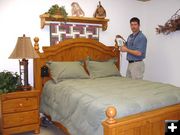

Sleep Center
Sleep Center. Photo courtesy St. John's Lutheran Hospital
|
|
Sleep Center offers sleep disorder services
by St. Johnís Lutheran Hospital
July 19, 2006
St. Johnís Lutheran Hospital in Libby is celebrating one year of operation for their Sleep Center this month. The Sleep Center offers diagnostic testing for all types of disorders, including Obstructive Sleep Apnea, Narcolepsy, Restless Leg Syndrome, REM Behavior Disorder and more.
According to Robert OíRourke, Respiratory Therapist and Sleep Center Coordinator, the Center completed 52 sleep studies in its first year of service and is booked into August. "We are very happy with the results of our first year," said OíRourke. "We are seeing more and more individuals each month, many of them through word of mouth. That tells us we have gained the confidence of the community, and that there was definitely a need to offer sleep disorder services locally."
St. Johnís also provides trained consultation, education, and treatment modalities, complimented by a comprehensive follow up program that offers sleep center patients a local contact they are familiar with for any of their questions or concerns. All of the testing is conveniently performed at St. Johnís.
It is estimated that approximately 70 million Americans suffer from some type of sleep problem; among them nearly 60 percent have a chronic disorder. There are 84 classified sleep disorders that can affect the quality of sleep.
Some of the major disorders are: Insomnia, Sleep apnea, Narcolepsy, Parasomnia, Restless leg syndrome and Periodic leg movements. Common symptoms associated with these disorders include snoring, breathing pauses while sleeping, sleepwalking, acid stomach, sleep terrors, tooth grinding, shift work sleep disorder, leg tremors, insomnia, daytime sleepiness and sudden loss of muscle tone.
Sleep problems affect men, women, and children of every age, race and socioeconomic class. Despite this widespread prevalence, most cases remain undiagnosed and untreated.
According to OíRourke, the most common sleep disorder diagnosed in the first year at the SJLH Sleep Center was sleep apnea and the most common symptoms being daytime fatigue and snoring. "Sleep apnea is a cessation of breathing during sleep. Because it disrupts the deeper sleep cycles, apnea is a major cause of excessive daytime sleepiness," said OíRourke. "It is the second most common sleep disorder after insomnia and affects about 40 million Americans. Sleep apnea is associated with and can lead to high blood pressure, coronary heart disease, heart attack, pulmonary hypertension, congestive heart failure, stroke, diabetes, neuropsychiatric problems, mental impairment and injury from accidents. Each year, sleep apnea accounts for about $42 million in hospital bills."
Another startling fact about sleep disorders is that they affect 25 percent of American children aged 1 to 5.
Symptoms parents should be aware of include:
ē Loud, frequent or constant snoring
ē Breaks in breathing for brief intervals during sleep
ē Daytime sleepiness
Sleep deprivation in children can cause daytime hyperactivity and a decrease in focused attention. This can be mistaken for Attention-Deficit-Hyperactivity-Disorder (ADHD) or other behavior disorders. If a child is having trouble with sleeping, or with daytime alertness, talk to a physician.
Related Links:
St. Johnís Lutheran Hospital, www.sjlh.com
|
